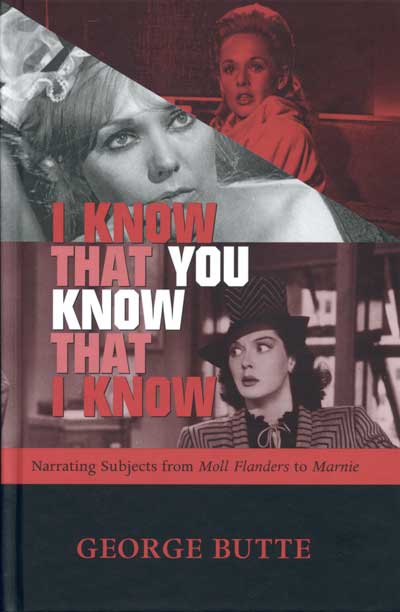 I Know That You Know That I Know
I Know That You Know That I Know
Narrating Subjects from Moll Flanders to Marnie
George Butte
“Eminently lucid and entirely new, this intriguing marriage of a resuscitated phenomenology with narrative theory has among its immediate offspring a revisionary view of characterization’s place in the rise of the novel from Defoe through Austen to Brontë. A decisive accomplishment in its own right, Butte’s exemplary study should generate ongoing work in these convergent theoretical veins.” —Garrett Stewart, James O. Freedman Professor of Letters, University of Iowa
“George Butte’s I Know That You Know That I Know is a major contribution to narrative theory and to the interpretation of novels and films. This brilliant book is the product of many years of research and teaching.” —J. Hillis Miller, UCI Distinguished Research Professor of English and Comparative Literature, University of California–Irvine
In I Know That You Know That I Know, Butte explores how stories narrate human consciousness. Butte locates a historical shift in the representation of webs of consciousnesses in narrative—what he calls “deep intersubjectivity”—and examines the effect this shift has since had on Western literature and culture. The author studies narrative practices in two ways: one pairing eighteenth-and nineteenth-century British novels (Moll Flanders and Great Expectations, for example), and the other studying genre practices—comedy, anti-comedy and masquerade—in written and film narratives (Jane Austen and His Girl Friday, for example, and Hitchcock’s Cary Grant films).
Butte’s second major claim argues for new ways to read representations of human consciousness, whether or not they take the form of deep intersubjectivity. Phenomenological criticism has lost its credibility in recent years, but this book identifies better reading strategies arising out of what the author calls poststructuralist phenomenology, grounded largely in the work of the French philosopher Merleau-Ponty. Butte criticizes the extreme of transcendental idealism (first-wave phenomenological criticism) and cultural materialism (when it rules out the study of consciousness). He also criticizes the dominant Lacanian framework of much academic film criticism.
George Butte is professor of English at Colorado College.
|
Jan
2004 Narrative, 19th and 20th century British and American literature 272 pp 6x9 |
|
| $39.95 paper 978-0-8142-5618-3 | Add paper to shopping cart |
| $32.95 PDF ebook 978-0-8142-8022-5 | Add PDF ebook to shopping cart |
| Theory and Interpretation of Narrative |


